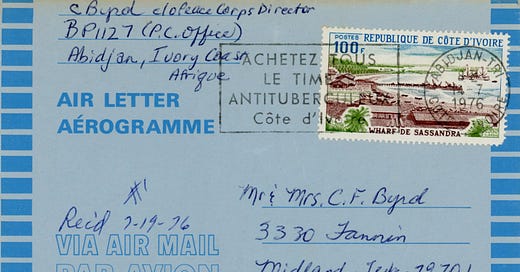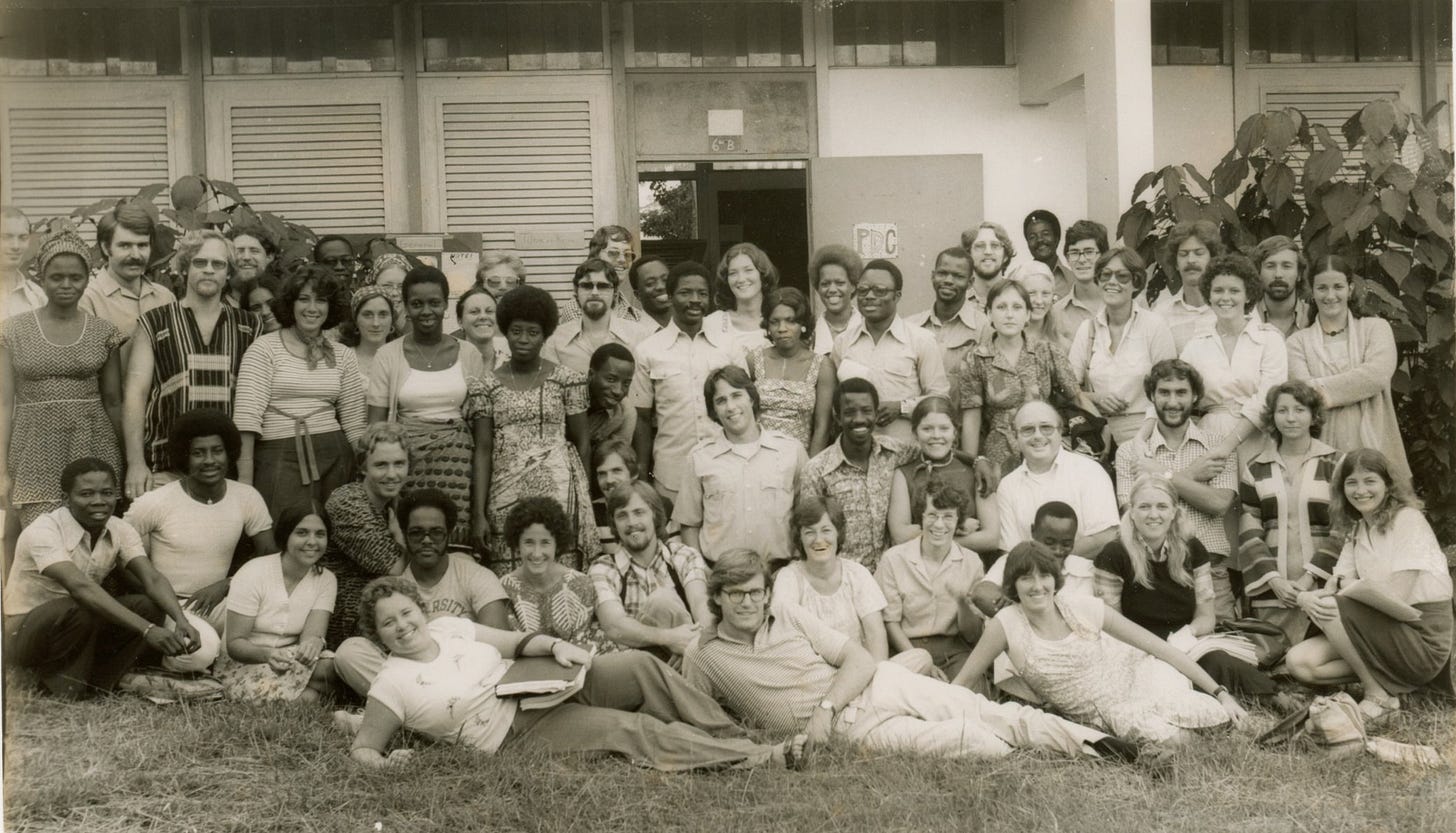Volunteering in the Peace Corps when I was 23 years old sparked a shift at my core that resonates to this day. Here’s a look back at my first impressions of Ivory Coast, the West African country I called “home” for two years.
journal entry 10 July + first letter to parents 12 July 1976
After a 10-hour flight from New York City, we burst into cheers as our plane touches the tarmac in Abidjan. We’ve arrived in Côte d’Ivoire, the country we’ll call home for the next two years! With 39 other Peace Corps trainees, I make it through customs without inspection, my giant parachute bag surprisingly intact. We climb onto two buses headed to the Lycée Sainte Marie. That’s where our first weeks of training will unfold.
Abidjan had us at Bonjour. As if by magic, our drivers navigate the urban maze without the help of street signs. Their passengers sit transfixed. Pulled in every direction at once, our eyes are popping with first impressions of Africa's Black Paris. Endless cars vie for the right of way—Volkswagens dance cheek to cheek with Deux Chevaux (Citroën’s 2CV econocar), vans and trucks transport loads of locals, and bright little orange taxis zip through the melee. Herds of sheep join the traffic. Rivers of vibrantly dressed people go about their business on foot, overflowing sidewalks. Women carrying baskets on their heads and babies on their backs move majestically through the crowds. A lagoon shimmers beneath the modern skyline that towers above us. The vivid greens and multihued outbursts of massive trees and flowering vines frame the city's panoramic tableau vivant.
The catholic girls’ school sits in the French quarter known as Cocody, the Beverly Hills of this city. The campus offers the perfect setup for training: private rooms in dorms (boys/girls), a lounge, two dining rooms, and, of course, classrooms. There’s a swimming pool, too, that will soon come to our daily rescue. A market and small shops are within walking distance. Arriving around 2pm, we choose beds in small narrow rooms, each with spare furnishings: a sink with faucet, a small table and chair, two wall shelves, a bed with mosquito net, a window without a screen, and a teeny closet. Bedding is provided, so no need yet for the linens we brought from home. Communal showers (cold water only; invigorating!) and toilets are down the hall. My monster bag won’t fit in the closet, so I’ve left it outside my door as a wayfinding device.
Franco-African cuisine is served here, and breakfast is my favorite meal. The morning café au lait with tartines takes me back to Paris and my au pair days with a family of French anthropologists on Rue de Sèvres.
Training begins. We take classes in teaching English as a Foreign Language, French, and Djula, a local dialect. Lucky me! I’m almost fluent in French. I get to study West African literature instead of enduring boring grammar and vocabulary drills. We’ll stay here until mid-August, then move upcountry to Abengourou for two more weeks of practice teaching. After that, we swear in as official Peace Corps volunteers and travel to our assigned towns/schools. Lots of work ahead. We’re vaccinated and take anti-malaria tablets once a week. Recipient of close to 20 inoculations in total, I’m ready for anything that comes my way.
It rained last night for the first time since our arrival. The wind gave the signal, and the sky released a torrent of water. Midland [my hometown in Texas] would have been completely submerged by one storm like this!
Don’t worry about me, I write in the first aerogramme to my family. The Americans and locals working with us are wonderful, and all the volunteers are looking out for each other.
My views do not necessarily reflect the opinions of the Peace Corps or the U.S. government.







How do I correct my email address if I want to subscribe?